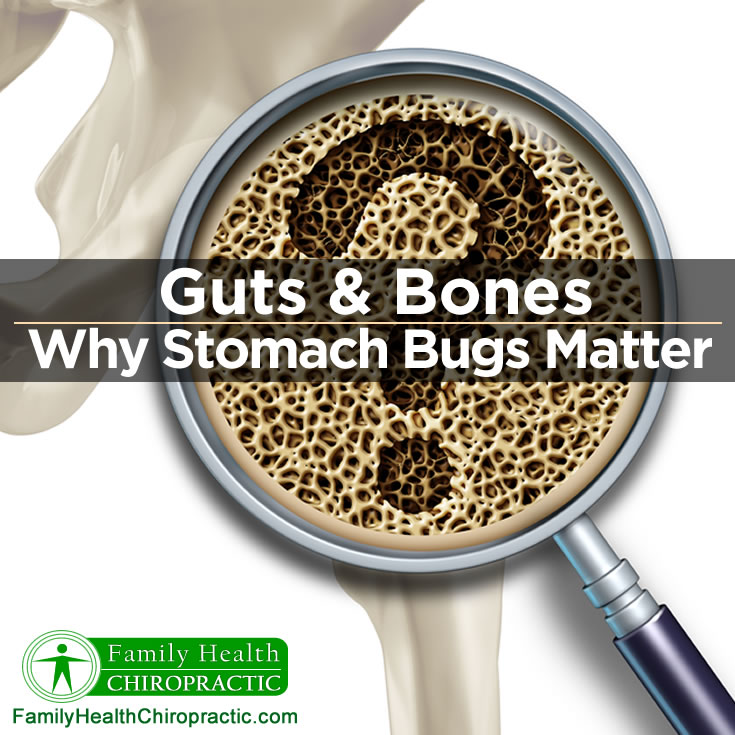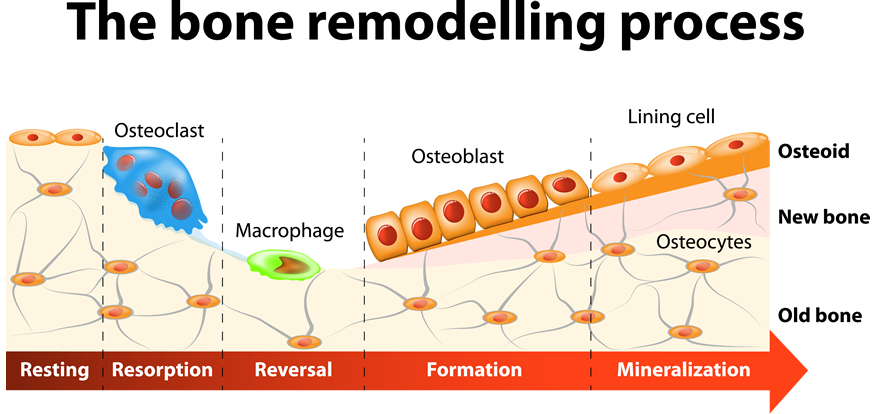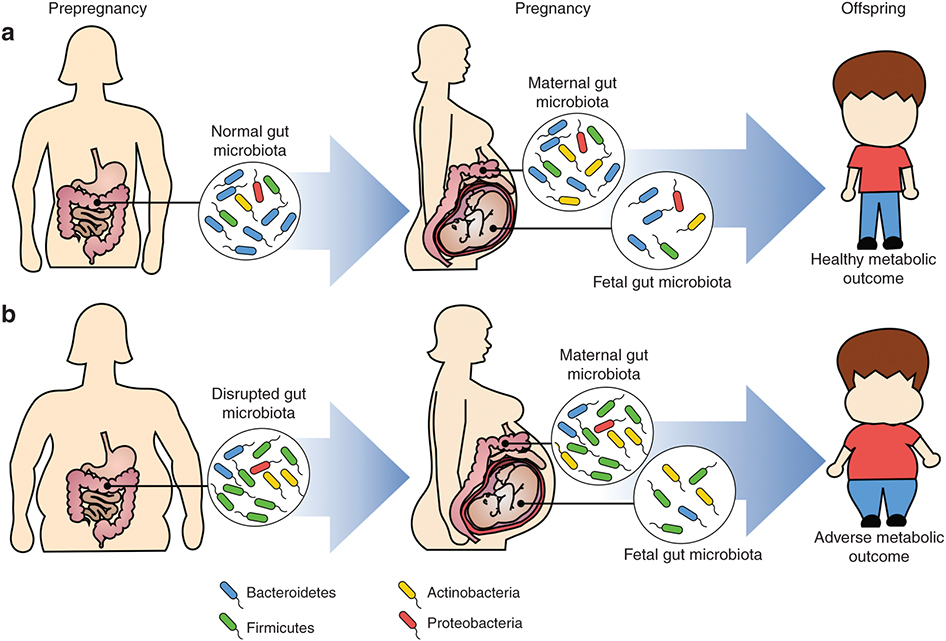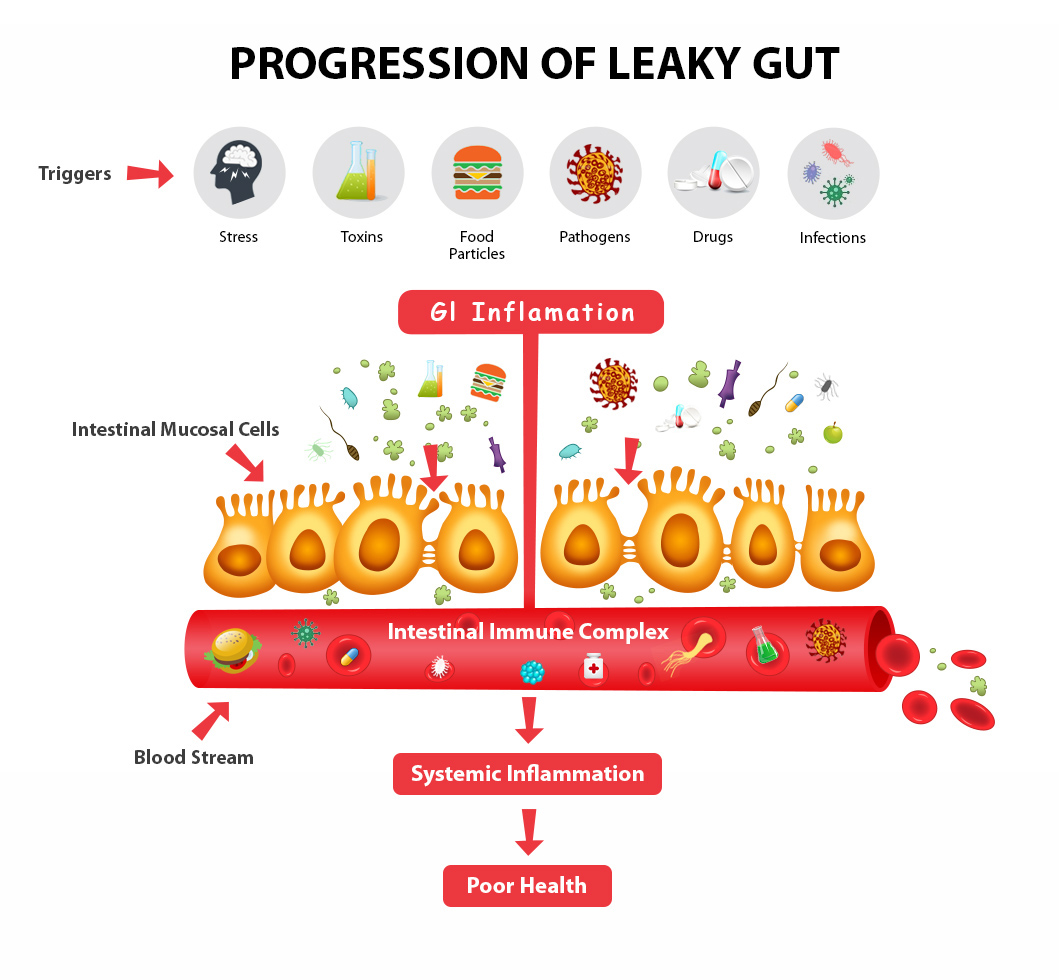More and more, scientists are beginning to realize that the human body has systems that rely on each other for optimal health. With the explosion of recent scientific articles on bacterial colonies within our digestive tract, it's becoming apparent that there may be a Gut-Bone relationship. This means that many of the bone diseases we suffer from, including osteoporosis and arthritis, may begin in the gut!
There are trillions of bacteria that live within our digestive system and scientists are increasingly appreciating their role in human health. Previously, I wrote about various connections between gut health and conditions such as:
- How to Heal a Leaky Gut
- Eliminate Allergies and Histamine Intolerance
- Are you Gluten Intolerant or Wheat Sensitive?
- 5 Foods that Heal Your Gut
Today, I want to cover the relationship between Guts & Bones! But first, let's cover some foundations on bone health.
Bone Health 101
When most people think of their bones, they think of solid and static structures. Truth is, your bone is constantly being remodeled and changes regularly. Old bone cells are removed from your skeleton by cells called osteoclasts (resorption) and new bone tissue is formed by cells called osteoblasts (ossification).
- Osteoclasts = Bone Resorption or Breakdown
- Osteoblasts = Bone Ossificatin or Formation
The process of bone remodeling is important for reshaping bone after fractures or heavy loads from activities such as exercise and sitting. However, imbalances in bone resorption and formation can result in bones diseases like osteoporosis and arthritis (1).
Now… we all know that one of the ways to measure bone health is through a DEXA scan, which identifies bone density. However, most people don't realize that just because you have increased bone mineral density or bone mass doesn't mean that you have increased bone health (2,3,4)!
Better Bone Density Does Not Guarantee Better Bone Health!
How The Microbiome Influences Bone Health
One of the best ways to study the effects of bacteria in the digestive tract, is to use mice that don't have any at all. Scientists call these mice “germ-free” mice and are born and raised in special incubators to protect them. As of today, there is no clear indication that more or less bacteria improve bone health, but there is a clear indicator that changes in the microbiome (bacteria within the digestive tract) influences bone structure both positively and negatively (5,6).
Bone & Gut Health Starts With Mom
We now know that there is direct, vertical transmission of microbes (gut bacteria) from mother to offspring at birth (7). In fact, the amount of “healthy” bacteria that you have is directly proportional to the amount of bacteria your mother had at birth. In addition, it's been shown that bone mineral density is 50-80% heritable (8). In light of this, one could hypothesize that this “inherited” bone density may in part, be due to the health of our mothers digestive tract prior to birth. Especially when we consider the new frontier of epigenetics or how environmental factors in early life can influence developmental processes and long-term health passed on to future generations (9).
Scientists have already begun to make strong correlations between GI disorders and disease and bone health. Patients with inflammatory bowel disease (IBS) show an increased risk of osteopenia, osteoporosis and bone fracture (10,11).
A Leaky Gut Destroys Your Bones
A Leaky Gut occurs when the lining of your intestines become compromised. Whether its stress, toxic chemicals, food, viruses, drugs or infections (and we all are exposed to these regularly), a leaky gut can cause some damage to your health!
When your intestinal wall is compromised, and bacterial components infiltrate your blood stream, your immune system responds with a large and in some cases even autoimmune inflammatory cascade. This is why leaky gut is associated with joint pathologies such as rheumatoid arthritis (12).
In essence, when these bacteria get into your bloodstream, your body goes crazy to fight them. This activates what is known as the innate immune receptors which has effects throughout the entire body. This is how digestive health is relate to various health conditions including bone health, building and remodeling.
Healthy Gut Bacteria Regulate Nutrients for Bone Health
There are a number of vitamins and minerals essential to bone health including calcium, phosphorous, vitamin D, vitamin K2, vitamin A, magnesium and strontium.
When there is disruption of the gut microbiome, there is altered nutrient absorption. When the lining of the gut is disturbed, the nutrient transporters that exists along this lining cannot do their job. This results in individuals who are both overweight and at the same time malnourished (13).
Protect Your Guts to Build Strong Bones
There are many factors when it comes to building strong bones, including genetics, diet, exercise or weight bearing stress, environment and yes gut health.
Here are four ways to improve gut health:
- Follow a Paleo or Whole30 Diet (eliminate grains/gluten)
- Consume Probiotics in the form of fermented foods as well as supplementation.
- Consume Prebiotics in the form of fiber rich foods such as chicory root, artichoke, dandelion greens and plantains.
- Consume Bone Broth daily. Bone broth not only heals the intestinal lining, but also provides all of the necessary vitamins and minerals for building strong bones!
Now… I’d like to hear from you.
Did this article change your understanding of Bone Density?
Do you or someone you know have Osteoporosis or Osteopenia?
Have you ever tried Paleo or Whole30?
Share your opinion in the comments or email me!
If You Like What You Read, Click Here For Weekly Updates






